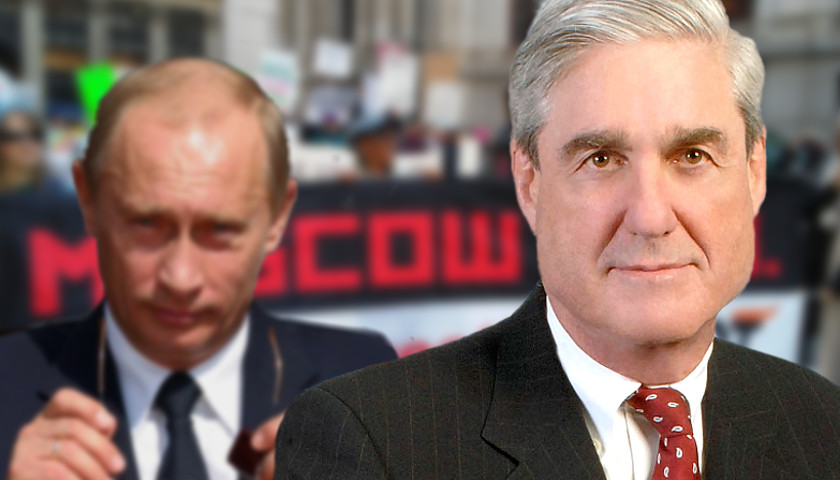
The indictments will never lead to a trial; they were not intended to do that. The bad guys are safely at home in Moscow, never to be seen again in the United States. But the indictments were a necessary career move for Mr. Mueller.
No one outside his circle of friends and associates knows what, if anything, Mr. Mueller has turned up to justify an investigation into whether Donald Trump colluded with Russians to cook the results of the election. Mr. Mueller seems to be widening the investigation into Mr. Trump's family because he can't find the evidence, if any, he was instructed to find. There is a growing public opinion that despite an occasional grunt and expectant squeak from the Mueller inner sanctum, Mr. Mueller has hit a dead end. A dry hole, as the oil drillers would call it.
Much was expected from Mr. Mueller, a man with a reputation for probity, ethics, honor, positive work habits and other good stuff, but so far, for all the grunting and squeaking, he has produced only a few miserable mice. None of the mice speak Russian with dreadful tales to tell.
Indicting evildoers in absentia is a prosecutor's good fortune. Since no one will ever come to trial, Mr. Mueller will never have to present a case to be judged whether weak, strong or otherwise. The 13 Russians comprise the ham sandwich that a good prosecutor is said to be able to indict at will. Mr. Mueller is going through the motions of demanding extradition, but that is only to make Mr. Putin laugh.
Mr. Mueller knows the chances of seeing them step off a plane from Moscow, with their hands in cuffs and facing the famous perp walk for the assembled reporters and photographers, are between zero and none. The Democratic dream of seeing Donald Trump in an orange jump suit is an ever more remote fantasy.
So far Mr. Mueller has not put a glove on the president, measured by what he has laid out for public consumption. Perhaps he will lay out the goods on a later occasion. But Rod Rosenstein, the deputy U.S. attorney general who made the thrilling announcement last week that more mice had been called to justice, went out of his way to concede that the 13 indictments say nothing about Mr. Trump and canoodling with Russians, and if anyone in the Trump campaign stumbled across a Russian it was "unwitting." Brushing against a Russian in a check-out line at Harris Teeter or Safeway is not collusion, but coincidence.
For all the diplomatic wizardry of reporters eager to emulate Woodward and Bernstein (hoping there would one day be a movie coming soon to a theater near you), and pundits ever ready for attack, so far few of them recognize the Russian game for what it is. Vladimir Putin was not out to elect an American president. He was out for bigger game.
He wants to mislead, confuse and confound, and some people get it. "When we are attacked by forcible warfare," writes Andrew McCarthy, a former U.S. prosecutor, in National Review, "we instantly grasp the nature of the threat and tend to pull together as a people. Information warfare is a different beast, one that plays on our vulnerabilities, dividing us. The Russians are masters of this game. They understand that unlike bombs and missiles, attacks by political messaging are filtered through our politicized media before Americans internalize them. The messages are not conveyed to us as ‘the Russians are trying to divide and destabilize us.' They are taken at face value if the commentators and partisans calculate that doing so is helpful to their political agenda. Thus, we get nonsense like, 'The Kremlin wanted Trump to win' and 'Putin was motivated by his fear and loathing of Hillary Clinton.'"
Vlad the Imposter loosed his cybernauts against America not to obstruct Hillary Clinton's path to the White House, but to sow discord and division, to stir resentment, to cripple her when she won, and then to wound Donald Trump after he foiled the expectations of all the wise men. That's why Vlad encouraged the post-election rallies against the winner. The idea was to set American against American, to stir up enough rant and rage that the wise men would be so busy with their anger that they would not stop to figure out Vlad's game.
The pieces fell into place with unexpected ease and precision. The new president was left wounded, the loyal opposition was cstuck in a permanent pout. Dysfunction is the name of the game, and everybody plays.
Comment by clicking here.
JWR contributor Wesley Pruden is editor emeritus of The Washington Times.


 Contact The Editor
Contact The Editor
 Articles By This Author
Articles By This Author